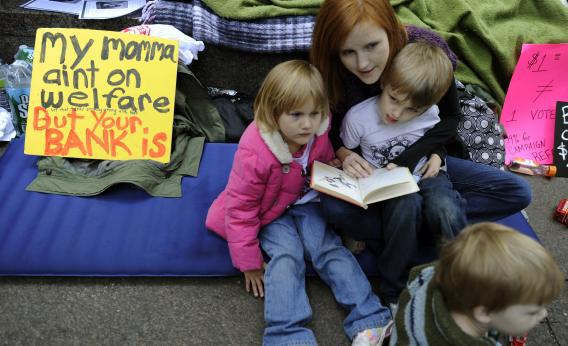Have you tried to make “Occupy Wall Street” a teachable moment? For the New York Times, Helaine Olen (who has also written for Slate) reports that children are an increasing presence in Zuccotti Park, both as protesters and as observers. A group called Parents for Occupy Wall Street organized a “family sleepover” at the park. The family pictured drove in from Pennsylvania to set up, with signs (“my momma ain’t on welfare but your bank is”). Other parents brought their kids to show them what it’s like to “be part of a large movement advocating social change” or at least display such a movement.
But what is the lesson of Zuccotti Park? We have a small Occupy Dartmouth encampment on the corner of Main Street and the college green in our small town, and I have offered my kids an explanation: that these are people who believe that it’s wrong that 1 percent of the U.S. population holds 42 percent of its financial wealth. But even as I said it, I questioned it. Is “income inequality” or even “Wall Street greed” really what brought people out, led them to stay, and is spreading an “occupy” message across the country?
In talking about the protests of the Arab Spring, parents had (and have) end goals to support an explanation of what moves people to actually take to the streets (in those instances, far more dangerous streets). Democracy. The end of a dictatorship. We knew, and the protesters knew, what would make them go home. There were complexities, yes: We still don’t know what victory will look like for women and religious freedom. That still left an easily simplifiable end game.
But what finally moved Americans to take up signs and chants? What will it take to make the protesters of OWS et al fold up their tents? The fulfillment of the Warren Buffett promise that’s working its way across Facebook? (“I could end the deficit in five minutes. You just pass a law that says that any time there’s a deficit of more than 3 percent of GDP, all sitting members of Congress are ineligible for re-election.”) Higher taxes on wealth? Passing a jobs bill that’s perceived as effective?
I’m not sure “income equality” or “advocating change” really covers it. An AP poll shows that 37 percent of the country supports Occupy Wall Street, but when opposition to our national decision to wage war in Iraq was even higher, with the exception of an occasional march, we stayed home. The vaunted “income inequality” hit headlines long ago. The nation’s riches citizens tripled their income not in the recent ugly months but over a period of decades between 1979 and 2007. What’s different, and why now?
What’s different is that “income inequality” feels far more powerful to people when unemployment is at 9 percent and feeling hopeless. The honesty of the mother who told Olen “I recently got laid off, that’s why I’m here,” may say more about what’s really happening in Zuccotti Park, and Oakland, and on the corner of Main Street, than any sign or human-microphoned chant.
We are a worried nation, feeling it in our pocketbooks, panicked about our future. In talking about Occupy Wall Street, we shouldn’t gloss over the fact that it wasn’t until that worry became personal that it became a political movement. We want to know where the hope for the college graduates and the unemployed and the poor and the middle class and everyone who isn’t hopping a helicopter to head for a yacht is going to come from, and that (plus a surplus of spare time) is what finally moved some of us to paint signs. It says a lot about our nation that the biggest protest of a complex and difficult time in our history finds its name not in Washington, but on Wall Street.
That’s a pretty hard thing to explain to a kid, but I think we have to try.
